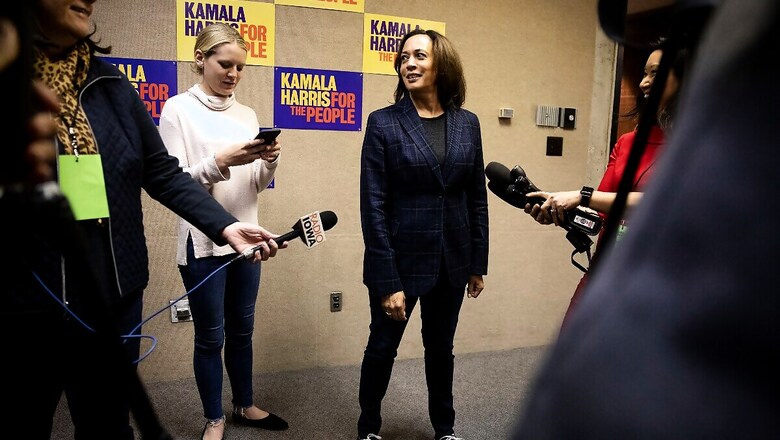
views
Sen. Kamala Harris of California, whom Joe Biden chose on Tuesday as his running mate, will be the first Black woman and the first person of Indian descent to be nominated for national office by a major party. A pragmatic moderate and one of Biden’s former rivals in the presidential race, Harris was a barrier-breaking prosecutor before being elected to the Senate in 2016.
Harris, 55, was born in Oakland, California. She is a former attorney general of California and a former San Francisco district attorney.
When she announced her own bid for the presidency — on Martin Luther King’s Birthday in 2019 — she pitched herself as a history-making candidate, paying homage to Shirley Chisholm, the New York congresswoman who became the first woman to seek the Democratic Party’s nomination for president.
Prosecutorial Background
Harris’ record as a prosecutor — she was the San Francisco district attorney from 2004 to 2011, and the California attorney general from 2011 to 2017 — was a major theme of her presidential campaign and will almost certainly be discussed in the general election, especially given the national outcry over police brutality and systemic racism since the killing of George Floyd.
Harris has described herself as a “progressive prosecutor” and argued that it is possible to be tough on crime while also confronting the deep inequities of the criminal justice system. She has said she became a prosecutor because she believed she could best change the system from within, a message that became a key part of her pitch as a presidential candidate: that voters could trust her to overhaul the justice system because she knew it “from the inside out.”
But aspects of her record have been a source of criticism, especially from the left.
As attorney general, she rarely prosecuted police officers who killed civilians, though by the time she left that office, she had opened some reviews of police departments. She was also criticized for refusing to allow advanced DNA testing that might have exonerated Kevin Cooper, a Black man on death row, and for defending some convictions against allegations of prosecutorial misconduct.
An opponent of the death penalty, she refused to seek it when a police officer was killed in San Francisco in 2004 — an episode that drew protests at the time but that she has pointed to as an example of her commitment to a fairer criminal justice system. But 10 years later, when a judge declared California’s death penalty unconstitutional, she appealed the decision, saying she was obligated to do so as the state’s attorney general.
The criminal justice plan she released during her presidential campaign contained a number of progressive policies that she had opposed earlier in her career.
Senate Career
Elected to the Senate in 2016, Harris was the first Black woman in the chamber in more than a decade. During her relatively brief time as California’s junior senator, she has become known for her intensive interrogations of Trump administration officials and nominees, including Brett Kavanaugh during his Supreme Court confirmation hearing and Attorney General Jeff Sessions during a Senate Intelligence Committee hearing.
In recent years, she sought to align herself more with the Democratic Party’s left wing, initially supporting Sen. Bernie Sanders’ “Medicare for All” bill before shifting her position during the presidential campaign. She has also backed proposals to raise the federal minimum wage to $15 an hour and revise the country’s bail system.
Harris has been a vocal supporter of racial justice legislation in response to the killing of Floyd, supporting proposals to overhaul policing and make lynching a federal crime.
She serves on several high-profile committees in the Senate, including the Intelligence Committee and the Judiciary Committee.
Presidential Campaign
Harris dropped out of the presidential race late last year after running low on money. She shot up in the polls after a strong first debate, but then fell and never really regained traction.
Yet when she entered the race in January, she was seen as one of the front-runners, and she had an impact on the early trajectory of the campaign.
Part of her influence was ideological: She was the first candidate, for instance, to suggest requiring federal preclearance for state abortion restrictions, a position that most of the Democratic candidates later expressed support for.
She had an electric moment in the first debate last June when she forcefully challenged Biden over his record on race. The way that exchange began was also notable: The moderators had not called on Harris, but she asserted herself by saying, “As the only Black person on this stage, I would like to speak on the issue of race.”
The interaction was an example of a quality that Harris’ campaign worked hard to play up, just as it played up her intense questioning in Senate hearings. Her team’s argument was that she could take control of any debate stage, including against President Donald Trump, and that she would not be intimidated by Trump’s bullying style of politics.
Broadly, however, she sometimes struggled to present a cohesive platform, most prominently on health care. In one well-publicized instance, she vacillated on whether enacting Medicare for All would mean eliminating private insurance.
Relationship with Biden
To many political observers, it might have seemed that the relationship between Harris and Biden was fraught. After all, in that first debate, Harris unleashed perhaps the most forceful — and memorable — attack on a rival of the entire primary campaign when she challenged Biden over his past opposition to busing as a means of integrating public schools.
It was “hurtful,” she said, to hear Biden speak positively about working with segregationist senators, because “there was a little girl in California who was part of the second class to integrate her public schools, and she was bused to school every day, and that little girl was me.”
Among some of Biden’s advisers, her debate-stage attack generated lingering resentment — even as recently as weeks ago. At a fundraiser in March, Jill Biden, the former second lady, called Harris’ debate stage remarks a “punch to the gut.”
But perhaps to stave off any doubts about their compatibility, Biden’s campaign immediately released a document on Tuesday about Harris that included a section on the “partnership” between the two politicians, noting that she had served as attorney general of California when Biden’s son Beau was attorney general of Delaware.
“The two grew close while fighting to take on the banking industry,” one bullet point read. “Through her friendship with Beau, she got to know Joe Biden.”
How voters may view her selection
During her presidential campaign, Harris appealed in particular to more moderate Democrats and those drawn to her biography. She could reinforce Biden’s appeal with Black women, suburban women and women generally who are eager to see themselves reflected in the country’s leadership.
Harris also has another potential secret weapon: her connection to the Alpha Kappa Alpha sorority, which she joined as an undergraduate at Howard University and whose roughly 300,000 members and multimillion-dollar budget could help provide fundraising and organizational might across the country.
But the progressive left, including some supporters of Sanders, will most likely be disappointed in Harris’ selection, viewing her as far more supportive of incremental change than the kind of broad, revolutionary proposals they champion. And her long career in law enforcement could be off-putting to some voters, especially younger voters, who are eager to see a police-reform movement with unqualified backing from the White House.
Maggie Astor and Sydney Ember c.2020 The New York Times Company

















Comments
0 comment